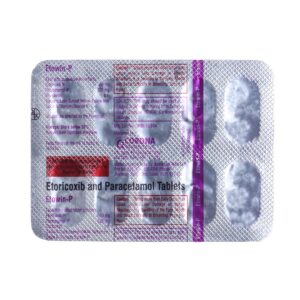PARACETAMOL + ETORICOXIB
Paracetamol: Paracetamol, also known as acetaminophen, is a commonly used over-the-counter medication used to treat pain and reduce fever. It belongs to the class of drugs known as analgesics and antipyretics.
Paracetamol works by inhibiting the production of prostaglandins in the brain, which are chemicals that are responsible for causing pain and fever. It is believed to work mainly in the central nervous system and does not have significant anti-inflammatory effects.
The recommended dosage of paracetamol varies depending on the age and weight of the patient. For adults and children over 12 years old, the usual dose is 325-1000 mg every 4-6 hours, with a maximum daily dose of 4 grams (4000 mg). For children, the dose is based on their weight and is typically around 10-15 mg per kilogram of body weight, given every 4-6 hours.
While paracetamol is generally considered a safe medication when used as directed, it does have some potential side effects. Common side effects include nausea, vomiting, stomach pain, and skin rash. In rare cases, it can cause serious skin reactions such as Stevens-Johnson syndrome or toxic epidermal necrolysis. Overdose of paracetamol can lead to liver damage, and it is important not to exceed the recommended daily dose.
It’s important to note that paracetamol is often an ingredient in combination medications, so it is essential to read the labels carefully to avoid accidental overdose. Also, individuals with liver disease or alcoholism should use paracetamol with caution and consult their healthcare provider before taking it.
Etoricoxib: Etoricoxib is a medication that belongs to the class of nonsteroidal anti-inflammatory drugs (NSAIDs). It is used to relieve pain and inflammation caused by conditions such as osteoarthritis, rheumatoid arthritis, ankylosing spondylitis, and gout.
The mechanism of action of etoricoxib involves the inhibition of an enzyme called cyclooxygenase-2 (COX-2). This enzyme is responsible for the production of chemicals called prostaglandins, which cause pain and inflammation. By inhibiting COX-2, etoricoxib reduces the production of prostaglandins, thereby relieving pain and inflammation.
The recommended dose of etoricoxib varies depending on the condition being treated. For osteoarthritis, rheumatoid arthritis, and ankylosing spondylitis, the usual dose is 60 mg once daily. For acute gout, the recommended dose is 120 mg once daily for up to a maximum of eight days.
Like other NSAIDs, etoricoxib may cause some side effects. Common side effects include headache, dizziness, stomach pain, indigestion, diarrhea, and nausea. Less common but more serious side effects may include liver problems, kidney problems, high blood pressure, heart problems, and allergic reactions. It is important to seek medical attention if any severe side effects occur.
Etoricoxib should be used with caution in individuals with a history of cardiovascular disease, high blood pressure, liver or kidney disease, or gastrointestinal ulcers. It is not recommended for use during pregnancy, as it may harm the unborn baby.
Overall, etoricoxib is an effective medication for relieving pain and inflammation associated with various conditions. However, it is important to use this drug under the guidance and prescription of a healthcare professional to minimize the risk of side effects and ensure its safe and effective use.

